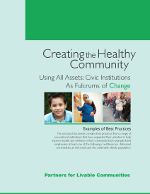San Francisco’s nationally recognized SPUR organization has some innovative solutions on how to make pricey San Francisco affordable again. These ideas (some tried & true and some out of the box) have the power to make the city even more of a success story!
- Protect the existing rent controlled housing stock.
- Reinvest in public housing.
- Double the amount of subsidized affordable housing.
- Make it much easier to add supply at all levels.
- Launch a wave of experiments to produce middle-income housing.
- Use new property taxes from growing neighborhoods to fund improvements to those Neighborhoods
- Reinvest in the transportation system, as a way to provide viable transit options and reduce household transportation costs
- Raise the minimum wage
Read SPUR’s full report here about their recommendations for improvement.
Read more »

Partners compiled a collection of best practices of traditional community institutions incorporating health and wellness into their agenda and programming to improve community health. The best practices focus on improving the health of at least one of three constituencies: distressed communities, at-risk youth, and the vulnerable elderly.
Examples of institutions include arts and culture organizations, botanical gardens, community development corporations (CDCs), faith-based organizations, libraries, museums, public markets, and zoos.
Click here to download Creating the Healthy Community - Using All Assets: Institutions as Fulcrums of Change
Read more »
Terms:Aging, Community Building, Community Development, Community Engagement, Creating The Healthy Community, Cultural Institutions, Health & Wellness, Healthy Communities, Institutions as Fulcrums of Change , Intergenerational, Libraries, Program Areas, Public Health
 An article published in the Washington Post earlier this week highlights the dramatic decline of the United States Postal Service and the financial difficulty that it is facing today. Since the passing of the Postal Accountability and Enhancement Act (PAEA) in 2006, the postal service has started running massive deficits has been forced to lay off tens of thousands of workers. To remedy this financial mess, the USPS has increasingly started to sell historic Post Office buildings, often centrally located on valuable tracts of land, to raise money. An article published in the Washington Post earlier this week highlights the dramatic decline of the United States Postal Service and the financial difficulty that it is facing today. Since the passing of the Postal Accountability and Enhancement Act (PAEA) in 2006, the postal service has started running massive deficits has been forced to lay off tens of thousands of workers. To remedy this financial mess, the USPS has increasingly started to sell historic Post Office buildings, often centrally located on valuable tracts of land, to raise money.
Read more »
On Thursday, the National League of Cities released The 10 Critical Imperatives Facing Cities in 2014, its annual report highlighting ten of the most pressing issues facing cities across the United States. Partners board member and incoming NLC President, Salt Lake City Mayor Ralph Becker explained during the report's unveiling, "This is not a wish list just of cities. This is a wish list of the people who live in America. That’s 80 percent of the population of America that’s being represented through us."
The ten items on the list were:
- Fragile Fiscal Health
- Deteriorating Transportation Infrastructure
- The Shrinking Middle Class
- Inadequate Access to Higher Education
- The Need for Affordable Housing
- A Less-Than-Welcoming Return for Veterans
- Gang Violence
- A Broken Immigration System
- Climate Change and Extreme Weather
- Lack of Public Trust
Click here to read the full report from NLC, which includes an overview of initiatives being taken by cities in their own efforts to tackle these ten challenges and create more livable communities for their residents.
Read more »
Terms:Community Building, Community Development, Downtown Development, Economic Development, Education, Environment, Health & Wellness, Housing, Immigration, Neighborhood Revitalization, Other Reports/Publications, Placemaking, Public-Private Partnerships, Transportation, Urban

Last month the nonprofit group America Achieves released a report titled Geek Cities: How Smarter Use of Data and Evidence Can Improve Lives through their Results for America initiative with support from Bloomberg Philanthropies. The report dissects how leaders in six major cities throughout the United States (and one initiative in London) are using data and technology to improve the lives of their residents. Rapidly improving technology and the digitalization of information has made mass data collection easier than ever, and cities are using this data to find effective programs and measures to combat social, economic, and physical challenges that many face today.
Read more »
|
|